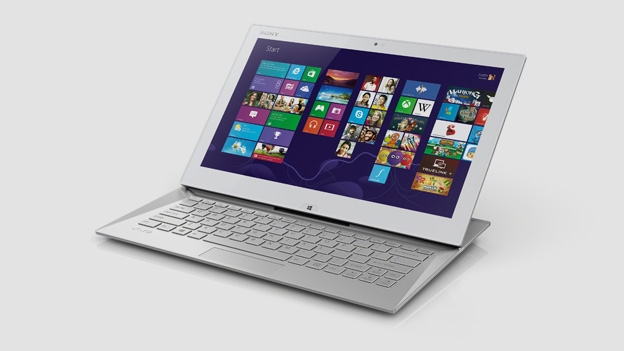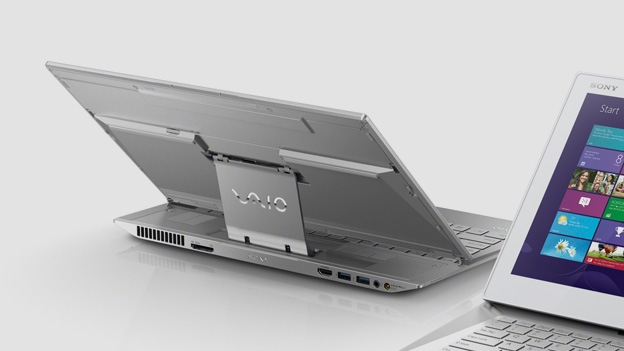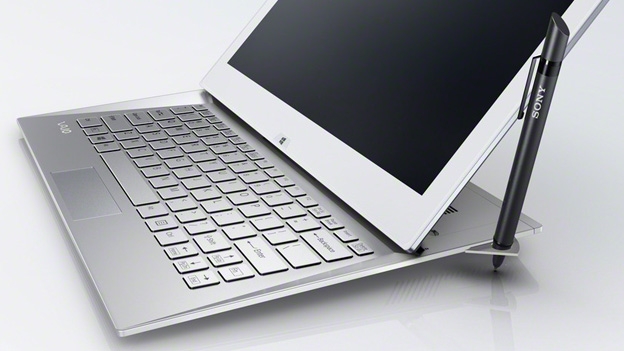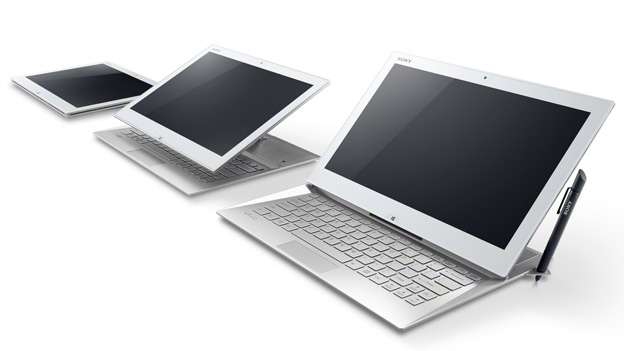Sony Vaio Duo 13 review
The Sony VAIO Duo 13 hybrid gets a Haswell makeover


-
+
Great screen
-
+
Light and thin
-
+
Amazing battery life
-
-
OMG! The price!
-
-
Sliders aren't for everyone
Why you can trust T3




As the lines between PC and tablet blur, can Intel's new 4th-generation processors turn the Sony VAIO Duo 13 into the best Windows 8 hybrid available?
It's been a long time coming, but Windows tablets are starting to gain some traction and the release of Intel's 4th-generation processors - known as Haswell - could be the shot in the arm Microsoft has needed.
The last few months has seen some promising hybrids that have promised to provide the portability of a tablets and usability of a tablet, such as the HP Envy X2, Sony VAIO Duo 11 and Dell XPS 10, not to mention Surface RT and Surface Pro.
However, none have quite managed to hit the spot, with short battery lives and limited performance plagued by cramped keyboards and heavy builds. With increased battery life a key feature of Haswell, it seems Intel might have solved one half of this problem, so let's see how Sony has fared with the other.
Sony VAIO Duo 13: Size and build
Unboxing the Sony VAIO Duo 13 for the first time, it's surprising how thick the tablet is due to the keyboard hiding beneath the screen, which is revealed by elevating the screen into a docked position. From the front the Duo is svelte and delicate, but the wedge shape means it's got some serious booty, only visible from the rear.
It's pretty chunky back there, measuring 19.5 mm at its thickest point, with a vent to cool that beefy Haswell chip, but the upside is that it's a great place to store that generous connectivity. The Sony enjoys two USB 3.0 ports, a full HDMI socket and an SD card slot, which is better than most ultraportables.
A light tug on the back of the Duo 13's screen is enough for it to spring from the base, held up by a hinge that pushes the screen to the back of the keyboard and at a 45 degree angle. At first we were concerned by the stability because the screen wobbled on its mount like a newborn baby's head - until we noticed the clips that secure the display.
This kept the screen solid enough to use as a touchscreen, but it means there's no way of adjusting the viewing angle. We had no complaints in every day use, but it was be annoying in cramped conditions like train carriages.
Elsewhere the aluminum build is extremely impressive, with little flex anywhere on its super-thin body. It looks and feels superb, although there is one downside.
In truth, we're still not sold on the sliding form-factor. There's a lot to like and it's extraordinarily slim and light, but despite inproved sturdiness since the Duo 11, there's a flimsy feel and the lack of adjustability is annoying.
What's more, the screen is continually exposed to the rigours of life on the move and if you did just want to use the Sony as a tablet to play games or surf the net as you lounge on the sofa, it's more awkward than a docking model.
Sony VAIO Duo 13: Features
Sony products are extremely customisable, which means you can add pretty much any configuration you need, but the £1,500 model features 4GB of RAM and a 128GB SSD. That's a lot of money for such average features, and aside from the super-thin build and Haswell processor, it's hard to know how Sony's arrived at that figure.
One of the key features of the Sony VAIO Duo 13 is the full QWERTY keyboard, and we were impressed by the comfort on offer. The keyboard has very little travel but it's well spaced and accurate, and one of the more enjoyable ultraportable keypads we've used.
There's also a mouse trackpad which is always handy in the less touch-friendly parts of Windows 8, though its ludicrously minute size means we stuck to the touchscreen.
If you want to get more creative or use business software, there's also a digitiser pen, which is all the rage on Windows 8 devices these days. Surface Pro comes packing one of these, as does the new Samsung ATIV Q, which uses the S-Pen tech from the Samsung Galaxy Note 2.
Sony's doesn't quite live up to those standards, with less levels of pressure and nowhere to house the pen when it's not in use - even Surface Pro lets you magnetically hang its pen on the side.
If you love to video call, the front camera supports 1080p recording, which means you'll look your best on Skype when traveling away from the family.
The Duo 13 also supports 3G, with room for a SIM card on the back, which will be good news for anyone that religiously carries a dongle with them.
Get all the latest news, reviews, deals and buying guides on gorgeous tech, home and active products from the T3 experts
Sony VAIO Duo 13: Screen
The previous 11-inch Sony Duo was one of the first hybrids to carry a full HD screen, so it's no surprise that its 13-inch successor follows suit. It's a gorgeous panel with deep colors that really shows off the best of Window 8. What's even better, however, is that at 13-inches, the back end of Windows isn't prohibitively small, which has been a problem on some of the more ambitious 11-inch devices.
One curious fact about the Sony is that it only supports five-finger input, rather than 10, but unless you're touch-typing onscreen or playing some very involved games, it shouldn't be an issue.
The viewing angles on the screen are excellent, and it works well in direct sunlight, too. The fantastic brightness offsets some of the blinding ambient light, although there is a glossy coating which does cause issues with reflections.
Sony VAIO Duo 13: Performance
This is the first Haswell machine we've got our hands on, so all eyes were on our benchmark tests to see what kind of score it would pull.
The Sony VAIO Duo 13 packs a low-power Intel Core i7 4500U, which is the best processor currently available for an ultraportable laptop. A third-generation version would score around 9,500 points in Cinebench 10, but the Sony's fourth-gen chip managed 11,500 - a substantial increase.
In real world terms this means very little. Both should eat up any task you could throw at it, perhaps only struggling at extreme graphical tasks.
Pixel-pushing is left to the onboard Intel HD 4400 part of the Haswell chip, which delivers decent performance, yet not a patch on a dedicated Nvidia or AMD card. Games are well within its reach, though if you want to play titles like Sim City you'll have to turn effects and shadows down to get a playable experience.
Sony VAIO Duo 13: Battery
While the increase in graphical and processor performance might not make headlines for Haswell and Sony, its battery life improvements will. Our test saw the Sony VAIO Duo 13 last over six hours of movie playback and document writing, which is an exceptional score given the lack of compromise on the processor.
The previous generation VAIO Duo 11 scored just 163 minutes in the same test, so having its latest incarnation last a whopping 380 is an extremely positive result. It means that the VAIO Duo 13 should last until you get home with a full day's use, which is the benchmark anyone should ask for when looking for a Windows tablet or hybrid.
Sony VAIO Duo 13: Verdict
It's been a fantastic performance from the Sony, and it's made a huge leap forward in terms of battery life. The touchscreen, Haswell and slim build combine to form one of the best Windows 8 laptops money can buy - just not one of the best tablets.
However, it's now time to talk about price and despite the wonderful positives and cutting edge technology, it's hard to recommend the Sony based on its asking price of £1,500.
To offer 4GB of RAM and 128GB SSD for such a figure is baffling, and it seems that Sony's asking people to pay a premium for the build and chassis, and based on our concerns about the design, it's not going to be for everyone.
It's a shame as there's a lot to like here, but looking around at the market, the impending appearance of the Samsung ATIV Q - another slider with a 3,200 x 1,800, 275ppi screen - means spending this much money is unwise. That said, if you're looking for a top-of-the-range laptop today and want the best Windows 8 experience money can buy, this should be on your shortlist.
Sony VAIO Duo 13 release date: Out Now
Sony VAIO Duo 13 price: From £1,329 (model reviewed £1,500)